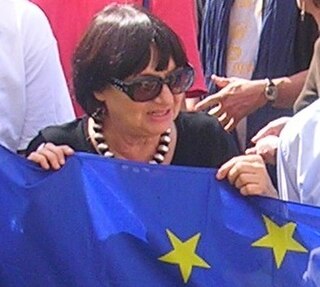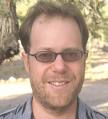Related Research Articles

The University of Arkansas is a public land-grant research university in Fayetteville, Arkansas. It is the flagship campus of the University of Arkansas System and the largest university in Arkansas. Founded as Arkansas Industrial University in 1871, classes were first held on January 22, 1872, with its present name adopted in 1899. It is noted for its strong programs in architecture, agriculture, communication disorders, creative writing, history, law, and Middle Eastern studies, as well as for its business school, of which the supply chain management program was ranked the best in North America by Gartner in July 2020.

Luisa Morgantini is an Italian former Member of the European Parliament. She was elected as independent with the Communist Refoundation Party ticket and sat with the European United Left - Nordic Green Left group.
The International Fellowship of Reconciliation (IFOR) is a non-governmental organization founded in 1914 in response to the horrors of war in Europe. Today IFOR counts 71 branches, groups and affiliates in 48 countries on all continents. IFOR members promote nonviolence, human rights and reconciliation through public education efforts, training programs and campaigns. The IFOR International Secretariat in Utrecht, Netherlands facilitates communication among IFOR members, links branches to capacity building resources, provides training in gender-sensitive nonviolence through the Women Peacemakers Program, and helps coordinate international campaigns, delegations and urgent actions. IFOR has ECOSOC status at the United Nations.
Peacemaking is practical conflict transformation focused upon establishing equitable power relationships robust enough to forestall future conflict, often including the establishment of means of agreeing on ethical decisions within a community, or among parties, that had previously engaged in inappropriate responses to conflict. Peacemaking seeks to achieve full reconciliation among adversaries and new mutual understanding among parties and stakeholders. When applied in criminal justice matters, peacemaking is usually called restorative justice, but sometimes also transformative justice, a term coined by the late Canadian justice theorist and activist Ruth Morris. One popular example of peacemaking is the several types of mediation, usually between two parties and involving a third, a facilitator or mediator.

The Walton Arts Center is a performing arts center. It is located in Fayetteville, Arkansas near the campus of the University of Arkansas, and serves as a cultural center for the Northwest Arkansas area. The building was opened in 1992 in large part because of funds donated by the Walton family. The center is host to many musicals, plays, and other artistic and educational events throughout the year.
A Walk of the People – A Pilgrimage for Life was a walking personal and political action organized by peace activists Dale James Outhouse and Pamela Blockey O'Brien to bring attention to the perils of impending nuclear war between the United States and the Soviet Union. Former European Parliament member and French Green Party co-founder Solange Fernex was the European organizer of the project.

The Sam M. Walton College of Business is the business college at the University of Arkansas in Fayetteville, Arkansas. Created in 1926, the college is the second-largest college at the University, with over 5,000 undergraduate students as of Fall 2016. Walton College is known nationally for a strong emphasis on retail, finance, information systems, and supply chain management. The college has a close relationship with Walmart Stores, Inc., based in nearby Bentonville, Arkansas, and related vendor community.

Michael P. Scharf is co-dean, Joseph C. Hostetler -- BakerHostetler professor of law, and the director of the Frederick K. Cox International Law Center at Case Western Reserve University School of Law. Scharf is also co-founder of the Public International Law & Policy Group (PILPG), a non-governmental organization (NGO) which provides pro bono legal assistance to developing states and states in transition. Since 1995 PILPG has provided pro bono legal assistance to states and governments involved in peace negotiations, drafting post-conflict constitutions, and prosecuting war criminals. Since March 2012, Scharf has also been the producer and host of Talking Foreign Policy, a one-hour radio program aired on a quarterly basis on Cleveland’s NPR affiliate WCPN 90.3 ideastream.

Michael D. Knox, is an American antiwar activist, educator, psychologist, and author, living in Dunedin, Florida. He is Emeritus Distinguished University Professor in the Department of Mental Health Law and Policy; Affiliate Distinguished Professor, Department of Internal Medicine; and Affiliate Distinguished Professor Emeritus of Global Health at the University of South Florida (USF) in Tampa, Florida.
The Pacifica Forum was a discussion group in Eugene, Oregon, United States. It was hosted by retired University of Oregon professor Orval Etter. It culminated a long slide into extremism by ceasing operations after Etter's death and has not been reconstituted.

The Thomas Merton Center is a non-profit grassroots organization in Pittsburgh whose mission is to educate, raise awareness and to ask the moral questions that surround issues of social justice, poverty, workers' rights, racial discrimination, environmental and economic justice, peace and nonviolence.
Samuel Totten is an American professor of history noted for his scholarship on genocide. Totten was a distinguished professor at the University of Arkansas, Fayetteville where he taught from 1987 to 2012 and served as the chief editor of the journal Genocide Studies and Prevention. He is a Member of the Council of the Institute on the Holocaust and Genocide, Jerusalem.

Randall Jay Amster is an American author, activist, and educator in areas including peace, ecology, homelessness, and anarchism. He is the director of the Program on Justice and Peace at Georgetown University, and writes for outlets ranging from academic journals to online news media.

Betty Lou Bumpers was an American politician, advocate for childhood immunizations, and world peace activist, who served as the First Lady of Arkansas from 1971 to 1975. Together, she and Rosalynn Carter ran a successful campaign to ensure that all American school children were immunized. Bumpers was also the wife of the late Dale Bumpers, the governor of Arkansas from 1971 to 1975 and then U.S. Senator from 1975 to 1999.

The Jimmy and Rosalynn Carter School for Peace and Conflict Resolution is a school of George Mason University based near Washington, D.C., United States with locations in Arlington, Fairfax, and Lorton, Virginia, as well as at the Mason Korea campus in Songdo, South Korea. On July 1st, 2020, the School for Conflict Analysis and Resolution officially became the Jimmy and Rossalyn Carter School for Peace and Conflict Resolution, following the university's announcement in March 2020
John Paul Capps is one of the longest-serving members of the state legislature in Arkansas.

The Arkansas Women's Hall of Fame is a non-profit, volunteer organization that recognizes women who have contributed to history of the U.S. state of Arkansas.
Silas Herbert Hunt was a U.S. veteran of World War II who became the first African American student to enroll in a white Southern university since the Reconstruction era. He enrolled in the University of Arkansas School of Law on Feb. 2, 1948, breaking the color barrier in higher education and starting integration of colleges and universities in the South.
Diana Rivers is an American writer, artist, and activist. She is the author of the Hadra book series and recognized as a pioneer of women-only spaces in Arkansas. Rivers is an advocate for LGBT rights, peace, racial equality, social justice, and ecology.

"No justice, no peace" is a political slogan which originated during protests against acts of ethnic violence against African Americans. Its precise meaning is contested. The slogan was used as early as 1986, following the killing of Michael Griffith by a mob of white youths.
References
- ↑ "IRS Form 990 2017" (PDF). Retrieved February 8, 2020.CS1 maint: discouraged parameter (link)
- ↑ "OMNI leaders". OMNI Center for Peace, Justice and Ecology. Retrieved February 8, 2020.CS1 maint: discouraged parameter (link)
- ↑ "OMNI Center for Peace, Justice and Ecology Records Addendum". University of Arkansas Libraries, Special Collections Department. Retrieved February 8, 2020.CS1 maint: discouraged parameter (link)
- ↑ "OMNI Center for Peace, Justice and Ecology". Central Arkansas Library System Encyclopedia of Arkansas. Retrieved February 8, 2020.CS1 maint: discouraged parameter (link)
- ↑ "OMNI seeks world peace with new strategies". The Free Weekly, Jan. 23, 2014. Retrieved February 8, 2020.CS1 maint: discouraged parameter (link)
- ↑ "Antiwar protesters take a stand in Fayetteville". Northwest Arkansas Democrat Gazette, January 5, 2020. Retrieved February 8, 2020.CS1 maint: discouraged parameter (link)
- ↑ "Jacob David George". Northwest Arkansas Democrat Gazette, October 1, 2014. Retrieved February 8, 2020.CS1 maint: discouraged parameter (link)